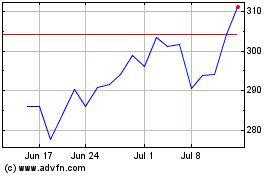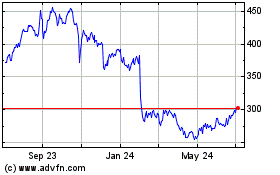FCC Awards $9.2 Billion for Construction of Rural Broadband Networks
December 07 2020 - 5:14PM
Dow Jones News
By Ryan Tracy
WASHINGTON -- The Federal Communications Commission dedicated
$9.2 billion to fund construction of rural broadband networks over
the next decade, in what the agency's leader called the biggest
ever U.S. step to extend high-speed internet service.
The funding will go to internet service providers, from
established rural operators such as Windstream Holdings Inc. to
newcomers such as cable provider Charter Communications Inc. and
Elon Musk's SpaceX. The companies bid against each other in an
auction designed to steer public money to the company willing to
build the fastest network in each area at the lowest cost.
"I'm thrilled with the incredible success of this auction, which
brings welcome news to millions of unconnected rural Americans who
for too long have been on the wrong side of the digital divide.
They now stand to gain access to high-speed, high-quality broadband
service," said FCC Chairman Ajit Pai.
The providers have 10 years to build the networks, with
incentives to do so sooner rather than later. The FCC said the
auction covered more than 5 million homes and businesses in 49
states. In about 85% of locations, the providers promised ultrafast
"gigabit" speed, the agency said. Most of the remaining locations
would see download speeds of at least 100 megabits a second,
capable of large downloads.
Of the 180 companies that made successful bids, LTD Broadband
LLC secured the most funding -- about $1.3 billion -- to serve more
than 500,000 homes and businesses. The company has previously used
tower-mounted "fixed wireless" technology. Charter, operator of the
Spectrum brand, secured about $1.2 billion to serve more than 1
million locations across 24 states. A consortium of rural electric
companies won about $1.1 billion.
Other entrants offering new, less-tested technologies also won
funding, including Space Exploration Technologies Corp., which is
launching a network of low-Earth-orbiting satellites. SpaceX sought
eligibility for the auction over some objections from competitors
using more established technologies, and secured $885 million to
serve locations across 35 states.
Representatives of LTD, SpaceX and Windstream had no immediate
comment. A Charter spokeswoman declined to comment, citing rules
that restrict auction participants from discussing bids.
Among states receiving funding, California topped the list with
$695 million, followed by Mississippi at $495 million.
The FCC said the auction saw "vigorous competition," covering
virtually every geographic area it opened for bidding. Officials
had set aside $16 billion for the auction but ended up needing $9.2
billion. The remaining $6.8 billion is expected to be available in
another planned FCC auction targeting additional unserved
locations.
Nick Del Deo, an analyst at telecom research firm
MoffettNathanson, said the slate of winners reflected the new
program's more competitive design. Past federal subsidies mostly
favored incumbent telephone companies and offered fewer dollars
through auctions.
"This time around, they structured it totally differently, so it
was a lot of nontraditional players," including wireless broadband
providers and rural electric cooperatives, Mr. Del Deo said. "It's
good public policy."
The auction is part of a yearslong, so far partially successful
push to extend broadband service universally across the U.S., a
need made all the more pressing this year as large numbers of
Americans work and learn from home during the coronavirus pandemic.
Since 2012, the FCC has spent at least $35 billion on the cause,
while the U.S. Agriculture Department and states have their own
subsidies. The FCC funding comes from fees on Americans' telephone
bills.
Nevertheless, the FCC reported recently that millions of
Americans still lack access either because they don't have access
to a network or they can't afford it.
One persistent problem is a lack of detailed maps of broadband
networks. The FCC relies on data reported by internet service
providers to determine where broadband networks exist, so it can
fund construction in places that don't have it. But providers can
report serving a whole area even if they reach only a single home
or business there. That means if one home in a rural area has a
broadband connection, the FCC might not fund construction to reach
the neighbors.
Democrats on the FCC had argued for delaying the latest auction
until the agency could be more confident in its broadband data. Mr.
Pai, a Republican, argued that despite the data flaws, the FCC knew
enough now to help many areas. He said future auctions will cover
still-unserved locations. The FCC has sought more funding from
Congress to fix data gaps.
Mr. Pai said last week he will leave office after
President-elect Joe Biden is inaugurated on Jan. 20, leaving the
job to a still unnamed Democratic successor at the FCC.
Mr. Biden has called for extending broadband to every U.S.
household.
--Drew FitzGerald contributed to this article.
Write to Ryan Tracy at ryan.tracy@wsj.com
(END) Dow Jones Newswires
December 07, 2020 16:59 ET (21:59 GMT)
Copyright (c) 2020 Dow Jones & Company, Inc.
Charter Communications (NASDAQ:CHTR)
Historical Stock Chart
From Mar 2024 to Apr 2024

Charter Communications (NASDAQ:CHTR)
Historical Stock Chart
From Apr 2023 to Apr 2024
